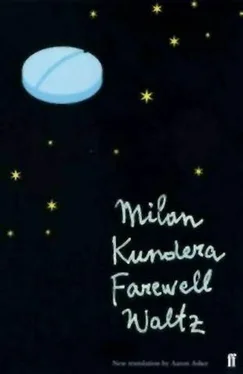and the man she had up until now believed was the only one in the world would become one among many.
She was at the wheel feeling sure of herself and beautiful, and she went on thinking: Was it really love that bound her to Klima or only the fear of losing him? And if it could be said that at the beginning this fear had been the anxious form of love, as time passed had not love (tired, worn-out) slipped away from that form? Was what finally remained only fear, fear without love? And what would remain if she lost that fear?
Beside her the trumpeter smiled inscrutably.
She glanced at him and told herself that if she ceased being jealous nothing at all would remain. She was driving at great speed, and she reflected that somewhere ahead on the road of her life a line indicating the breakup with the trumpeter had already been traced. For the first time, this idea inspired neither anxiety nor fear in her.
It was evening. Olga entered Bertlef's suite and excused herself: "Pardon me for barging in on you. But I'm in such a state I can't be alone. I'm not disturbing you, am I?"
In the room were Bertlef, Dr. Skreta, and the inspec-
tor; it was the latter who answered Olga: "You're not disturbing us. Our conversation now is unofficial."
"The inspector is an old friend of mine," the doctor explained to Olga.
"Why did she do it?" Olga asked.
"She had a fight with her boyfriend, and in the middle of the argument she took something out of her bag and swallowed poison. That's all we know, and I'm afraid that's all we'll ever know," said the inspector.
"Inspector, please," Bertlef said forcefully, "I beg you to pay attention to what I said in my statement. Here, in this very room, I spent with Ruzena the last night of her life. Perhaps I have not sufficiently emphasized the main thing. It was a wonderful night, and Ruzena was immensely happy. That unassuming girl only needed to throw off the shackles she had been locked into by her indifferent and dreary companions to become a radiant being filled with love, sensitivity, and high-minded-ness, to become the person you would not have suspected was inside her. I am positive that last night I opened for her the door to another life, and it was just last night that she began to have a desire for life. But then someone stood in the way…" said Bertlef, suddenly pensive, and then he added softly: "I sense in it hell's intervention."
"The police don't have much influence over the infernal powers," the inspector said.
Bertlef did not respond to the irony. "The suicide theory really makes no sense," he replied. "Please understand, I beg you! It is impossible that she would
kill herself at the very moment when she was wishing to begin to live! I repeat, I will not allow her to be accused of suicide."
"My dear sir," said the inspector, "no one is accusing her of suicide, for the good reason that suicide is not a crime. Suicide is not something that concerns justice. It's not our concern."
"Yes," said Bertlef, "suicide is not a crime for you because life has no value for you. But I, Inspector, do not know of a greater sin. Suicide is worse than murder. One can murder for vengeance or out of greed, but even greed is the expression of a perverted love of life. But to commit suicide is to throw one's life down contemptuously at God's feet. To commit suicide is to spit in the Creator's face. I tell you that I will do everything I can to prove that this young woman is innocent. Since you maintain that she did away with herself, please explain why. What motive have you found?"
"Motives for suicide are always mysterious," said the inspector. "Besides, looking for them isn't within my purview. Don't hold it against me for confining myself to my duties. I've got enough of those and hardly any time. The case is obviously not yet closed, but I can tell you in advance that I'm not thinking of the homicide theory."
"I admire your quickness," said Bertlef acidly, "your quickness to cross out a human being's life."
Olga saw the inspector's cheeks redden. But he controlled himself, and after a brief pause said in a voice that was almost too amiable: "All right, I accept your theory that a murder has been committed. Let's ask
ourselves how it could have been perpetrated. We found a tube of tranquilizers in the victim's handbag. One could assume that the nurse wanted to take a tablet to calm herself but that someone had previously slipped another tablet into the medicine tube, one that looked like the others but contained poison."
"You think that Ruzena got the poison from the tube of tranquilizers?" asked Dr. Skreta.
"Of course, Ruzena could have got the poison not from the tube but from elsewhere in the handbag. That's what would have happened if it was suicide. But if we adopt the murder theory, we have to accept that someone slipped into the medicine tube a poison that could be mistaken for one of Ruzena's tablets. That's the only possibility."
"Pardon me for contradicting you," said Dr. Skreta, "but it's not so easy to turn an alkaloid into a normal-looking tablet. For that, you need access to pharmaceutical machinery, which isn't available to anybody around here."
"Are you saying it's impossible for an ordinary person to get such a tablet?" the inspector asked.
"It's not impossible, but it's extremely difficult."
"It's enough for me to know that it's possible," said the inspector, and he went on: "Now let's ask ourselves who might have had an interest in killing this woman. She wasn't rich, so we can rule out any financial motive. We can also eliminate political motives or espionage. So we're left with motives of a personal nature. Who are the suspects? First of all, Ruzena's lover, who
had a violent quarrel with her just before her death. Do you believe he was the one who gave her the poison?"
No one answered the inspectors question, and he continued: "I don't think so. The boy was still fighting to keep Ruzena. He wanted to marry her. She was pregnant by him, and even if the child was another man's, what matters is that the boy was convinced she was pregnant by him. When he learned that she wanted an abortion he felt desperate. But please bear in mind that Ruzena had come back from the Abortion Committee, not from the abortion! For our desperate boy, all was not yet lost. The fetus was still alive and he was ready to do anything to save it. It's absurd to think that he would have given her poison at that point, when all he was hoping for was to live with her and have a child with her. Besides, the doctor has explained to us that it isn't possible for just anybody to procure poison that looks like an ordinary tablet. Where could this naive boy with no connections procure it? Would you explain that to me?"
Bertlef, whom the inspector kept addressing, shrugged his shoulders.
"Let's go on to other suspects. There's that trumpeter from the capital. It was here that he became acquainted with the deceased, and we'll never know to what point their relations went. In any case they were close enough for the deceased to ask him to pass himself off as the father of the fetus and to appear with her before the Abortion Committee. Why did she ask him rather than someone from around here? It's not hard to
guess. Any married man living in this little spa town would be afraid of trouble with his wife if word got around. Only someone from somewhere else could have done Ruzena that favor. What's more, the rumor that she was expecting the child of a famous artist could only be flattering to the nurse and could not harm the trumpeter. We can therefore assume that Mister Klima heedlessly agreed to do her the favor. Is that a reason to murder the poor nurse? It's highly improbable, as the doctor has explained to us, that Klima was really the child's father. But examine even that possibility. Let's assume that Klima was the father and that this was extremely disagreeable to him. Can you explain to me why he would kill the nurse when she had agreed to terminate the pregnancy and the operation had already been authorized? Now, Mister Bertlef, do you really want to say that Klima is the murderer?''
Читать дальше










